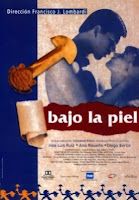 Bajo la piel is a strange film, and also a distinctly creepy one. It opens with a scene of a man in a hammock declaring that life is good, that he has discovered that happiness really exists, although he learned the lesson only lately, and closes with the same scene of Edenic bliss. What's shown in the interim, however, is a dark take on a Peruvian society in which primitive violence lurks "under the skin" of even the most respectable façade. And it's the disconnect between the apocalyptic vision and the contented declaration that gives this film its sinister edge. Comparisons with Hitchcock are not altogether out of line.
Bajo la piel is a strange film, and also a distinctly creepy one. It opens with a scene of a man in a hammock declaring that life is good, that he has discovered that happiness really exists, although he learned the lesson only lately, and closes with the same scene of Edenic bliss. What's shown in the interim, however, is a dark take on a Peruvian society in which primitive violence lurks "under the skin" of even the most respectable façade. And it's the disconnect between the apocalyptic vision and the contented declaration that gives this film its sinister edge. Comparisons with Hitchcock are not altogether out of line.The happy hammock-swinger turns out to be a provincial police chief by the name of Percy Corso. At the story's outset, he's faced with the fact that a serial killer is on the loose, who has so far killed four young men, decapitating them and removing their eyes. The town is up in arms, and the mayor in particular is putting pressure on Corso to solve the case quickly, so that upcoming festivities can take place without this shadow of fear. But our man Percy, normally a solitary and rational type who once had dreams of being a lawyer and now spends his spare time playing solitaire chess, finds himself distracted with a new arrival: Marina, a fiery young Spaniard, who has taken up the post of local pathologist.
 Marina's over-sexed proclivities extend, it seems, to demanding of Percy impulsive sex when the two are exploring the local ruins, in the past site of bloody sacrifice. Whatever turns you on. But Marina has a problem with commitment, and is soon also found screwing the town gigolo, a young man who happens also to be the mayor's reprobate son.
Marina's over-sexed proclivities extend, it seems, to demanding of Percy impulsive sex when the two are exploring the local ruins, in the past site of bloody sacrifice. Whatever turns you on. But Marina has a problem with commitment, and is soon also found screwing the town gigolo, a young man who happens also to be the mayor's reprobate son.The policeman is soon rather more preoccupied with the sexual adventures of his would-be lover, but in the meantime he does manage to solve the serial killer case. All the evidence leads to the fact that the perpetrator is a bespectacled archaeologist who shows unusual scholastic interest in the savage ways of pre-Columbian civilizations. Only he had access to the golden but gruesome Moche instrument of decapitation that turns out to have been the murder weapon. But banged up in police cells, Professor Pinto shows no great willingness to talk, and in the face of the man's stubborn silence Percy returns to fretting about Marina.
Things quickly get out of hand when Corso decides to take the mayor's son out drinking, torturing himself by listening to the young man's bravado descriptions of his bohemian lifestyle. Percy snaps, killing and decapitating his rival in copycat style, taking advantage of the original murder's suicide to fake a prison break and then burying both bodies out in the desert. And one stage we think (fear?) that the cop will be rumbled for this crime, but eventually as we've seen all turns out happily ever after. In the film's final scene the camera shifts from Corso in his hammock to Marina in the background, apparently barefoot and pregnant, now fully beholden to the alpha male.
So the movie is disturbing not only for its depiction of a millennial savagery that runs from pre-historic times to the present, but also and above all for its reluctance to take any moral stance. We may increasingly find it hard to identify with its policeman protagonist, especially as he passes the line from law-enforcer to law-breaker, but still less sympathy is shown for his victim or indeed almost anyone else around and about. The movie is singularly detached from the violence it portrays. Or perhaps on the contrary: it's as though it were too close to the bone for the director to be able to take some inevitably hypocritical moral stance.
No comments:
Post a Comment